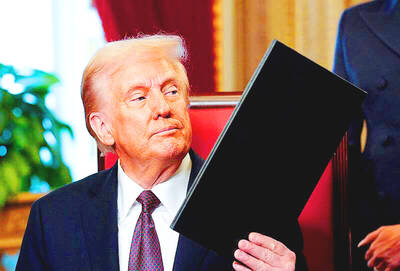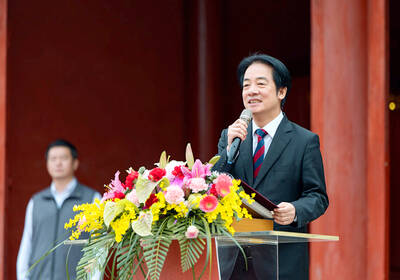The US House Subcommittee on Asia and the Pacific has amended and watered down a resolution offering strong support for Taiwan on the 30th anniversary of the Taiwan Relations Act (TRA).
It has angered some members of the subcommittee and Congressional sources said that it came as a result of direct pressure from Beijing.
Subcommittee chairman Eni Faleomavaega, a Democrat from American Samoa, who was chiefly responsible for changing the wording of the resolution, admitted later that he had experienced pressure “from both sides.”
He said that “things get very emotional” around the Taiwan issue and that the resolution as amended was more appropriate.
“It is better for the people of Taiwan,” he said.
Introducing his amended resolution, Faleomavaega said that the future of Taiwan was “for people on both sides of the Strait to resolve.”
Analysts said later that there appeared to be three substantive changes to the resolution, which now goes before the Committee on Foreign Affairs before being presented for full House approval.
The original resolution, as proposed by 18 members of the House, said it was the policy of the US to provide defense articles and defense services “in such quantity as may be necessary to enable Taiwan to maintain a sufficient self-defense capability.”
But the new version replaces that language with “it is the policy of the US to provide Taiwan with arms of a defensive character to maintain the capacity to resist any resort to force or other forms of coercion.”
The reference to quantity was removed.
The original resolution also said that the relationship between the US and Taiwan had been strengthened with “the development of Taiwan’s robust free-market economy, with Taiwan becoming the ninth largest trading partner of the US in 2007 and imports from the US in that year totaling over US$26 billion.”
Faleomavaega shortened that statement to say relations had been strengthened with “the development of Taiwan’s robust free-market economy.”
The original, more detailed wording was designed to help efforts to push through a free-trade agreement with Taiwan.
Subcommittee member Edward Royce, a California Republican Representative, said: “While this resolution highlights many of the positive attributes of the US-Taiwan relationship, language detailing our important economic relationship was regrettably struck from the introduced text.”
“The truth is that trade is very important to Taiwanese security. Security isn’t based on weapons alone. It may be wishful thinking with this administration and Congress, but I’d like to see movement on a free-trade agreement with Taiwan. Certainly, if we throw up trade barriers, it would do much to destabilize Taiwan’s economy. Let’s not give trade short shrift,” he said.
Faleomavaega said later that he did not think the time was right for a free-trade agreement with Taiwan.
The third point, which concerns pro-Taiwan interests in Washington, comes in the interpretation of a single word.
The original resolution said that Congress “reaffirms its unwavering commitment to the Taiwan Relations Act as the cornerstone of United States relations with Taiwan.”
But Faleomavaega’s version reads that the TRA is simply “vital to relations between the US and Taiwan.”
Coen Blaauw, executive director of the Formosan Association for Public Relations (FAPA), said: “Replacing ‘cornerstone’ with ‘vital’ is a big step in the wrong direction.”
“The changes have certainly weakened the resolution and they benefit the Chinese position. China does not want the TRA to be seen as the cornerstone of US-Taiwan relations,” Blaauw said.
In a message to members of the full committee, Blaauw said: “Maybe there is some political thing going on in Faleomavaega’s subcommittee and hopefully in the full Committee mark-up next week someone can bring the earlier language back, but the new text is really not good.”
“The reason why we at FAPA coined the phrase ‘cornerstone of US-Taiwan relations’ is, of course, because the Chinese always insist that the Three Joint US-China communiques are the cornerstone of the US-Taiwan-PRC triangular relationship. You know why: Because in the communiques the US acknowledges the Chinese position that Taiwan is part of China. The people of Taiwan had zero say in the conclusion of these three detrimental-to-Taiwan communiques,” he said.
In a press statement, TECRO in Washington put a brave face on the situation and said: “This resolution reaffirms the US’ unwavering commitment to the Taiwan Relations Act, reaffirms US support for Taiwan’s democratic institutions and supports the strong and deepening relationship between the US and Taiwan.”
“As the 30th anniversary of the enactment of the TRA draws near, the action by the US Congress today clearly demonstrates the friendly and close relationship between Taiwan and the US,” it said.

THREATS: Naval facilities have been built in Shanghai and Zhejiang, while airbases have been expanded in Xiamen, Fuzhou and Zhangpu, across the Strait from Taiwan The Chinese Communist Party (CCP) is building large-scale military infrastructure at five sites along the eastern coast of China, the Mainland Affairs Council (MAC) said in a recent report. The latest issue of the council’s Mainland China Situation Quarterly said satellite photos showed military infrastructure such as air force and naval bases being constructed along the eastern coast of China. That means the CCP might be preparing for potential conflict in Taiwan, it said, adding that there are five such construction sites from north to south. A naval base has been built in Shanghai’s Pudong New Area, with underground oil storage tanks, railway

MILESTONE: The foreign minister called the signing ‘a major step forward in US-Taiwan relations,’ while the Presidential Office said it was a symbol of the nations’ shared values US President Donald Trump on Tuesday signed into law the Taiwan Assurance Implementation Act, which requires the US Department of State to regularly review and update guidelines governing official US interactions with Taiwan. The new law is an amendment to the Taiwan Assurance Act of 2020 focused on reviewing guidelines on US interactions with Taiwan. Previously, the state department was required to conduct a one-time review of its guidance governing relations with Taiwan, but under the new bill, the agency must conduct a review “not less than every five years.” It must then submit an updated report based on its findings “not later

GIVE BACK: The president thanked immigrants, recounting heartwarming stories, from a gymnast helping athletes shine internationally to a spouse helping the disadvantaged There is no need to amend the law to exempt Chinese spouses from single allegiance to the Republic of China (ROC), President William Lai (賴清德) said yesterday, adding that such changes would only increase the public’s doubts toward new residents from China and would not improve social harmony. Taiwan is a democratic, diverse and free country, he said. “No matter which ethnic group you belong to, where you come from or when you arrive, as long as you identify with Taiwan, you are masters of this country,” he said. Taiwan is a democratic nation that follows the rule of law, where immigrants are

A trial run of the north concourse of Taiwan Taoyuan International Airport’s new Terminal 3 is to commence today, the Ministry of Transportation and Communications said yesterday. The eight additional boarding gates would allow for more aircraft parking spaces that are expected to boost the airport’s capacity by 5.8 million passengers annually, Deputy Minister of Transportation and Communications Lin Kuo-shian (林國顯) said. The concourse, designed by a team led by British architect Richard Rogers, provides a refreshing space, Lin said, adding that travelers would enjoy the tall and transparent design that allows sunshine to stream into the concourse through glass curtain walls. The